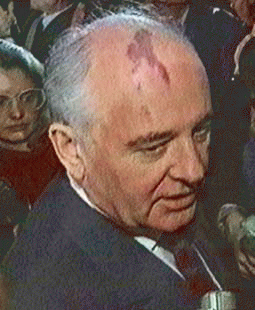|
Communism in Russia all started with the Bolshevik Revolution in October 1917. The Bolsheviks' successful rise to power was based upon the slogans "peace, bread, and land" and "All power to the Soviets", slogans which tapped the massive public desire for an end to Russian involvement in the First World War, the peasants' demand for land reform, and popular support for the Soviets.
During the Russian Civil War (1918-1922), the Bolsheviks imposed a policy of war communism, which put factories and railroads under strict government control, collected and rationed food, and introduced some bourgeois management of industry. After three years of war and the 1921 Kronstadt rebellion, Lenin declared the New Economic Policy (NEP) in 1921, which was to give a "limited place for a limited time to capitalism." The NEP lasted until 1928, when Joseph Stalin achieved party leadership. Following the Russian Civil War, the Bolsheviks formed in 1922 the Union of Soviet Socialist Republics (USSR), or Soviet Union, from the former Russian Empire.With the allied victory in the Second World War in 1945, the Soviet Army had occupied nations in both Eastern Europe and Asia; as a result, communism as a movement spread to many new countries. This expansion of communism gave communists power almost in all parts of the world.
Communism in Russia was hell. Strict laws and persecutions were common things and millions of people died because they lacked the necessities to survive. If you didn’t work you would most likely go to jail. You could not buy land; you could only receive it from the government because all the land belonged to the state. The pay was very low and with the amount of money you received you could barely feed yourself. Devastation was around every corner and living conditions were terrible. Communism is also atheistic. Therefore, Communism was seen as an attack on the freedom of religion, and most religious groups were very strongly opposed to Communism. Fear of aggressive investigations, blacklisting, jailing, deportation, and deaths of many innocent people also scared many Russian citizens.
 In 1985, Mikhail Gorbachev became leader of the Soviet Union and relaxed central control. The Soviet Union did not intervene as Poland, East Germany, Czechoslovakia, Bulgaria, Romania, and Hungary all abandoned Communist rule by 1990. Boris Yeltsin, was named President of Russia by the Russian Republic's Supreme Soviet in 1990. He immediately resigned from the Communist party and declared Russia's independence. In 1991, the Soviet Union itself dissolved.The Russian economy is in disarray, and the standard of living for the average citizen is as low as it can be. This mainly due to the fact that because the Soviet government has no experience in Democratic/Capitalist styles of governing, and the 70 plus years of Communist rule has left a huge dent in the Russian economy. Education is terrible, but the distribution of wealth is going well. This shows that Communism was terrible in every single way. In 1985, Mikhail Gorbachev became leader of the Soviet Union and relaxed central control. The Soviet Union did not intervene as Poland, East Germany, Czechoslovakia, Bulgaria, Romania, and Hungary all abandoned Communist rule by 1990. Boris Yeltsin, was named President of Russia by the Russian Republic's Supreme Soviet in 1990. He immediately resigned from the Communist party and declared Russia's independence. In 1991, the Soviet Union itself dissolved.The Russian economy is in disarray, and the standard of living for the average citizen is as low as it can be. This mainly due to the fact that because the Soviet government has no experience in Democratic/Capitalist styles of governing, and the 70 plus years of Communist rule has left a huge dent in the Russian economy. Education is terrible, but the distribution of wealth is going well. This shows that Communism was terrible in every single way.
|